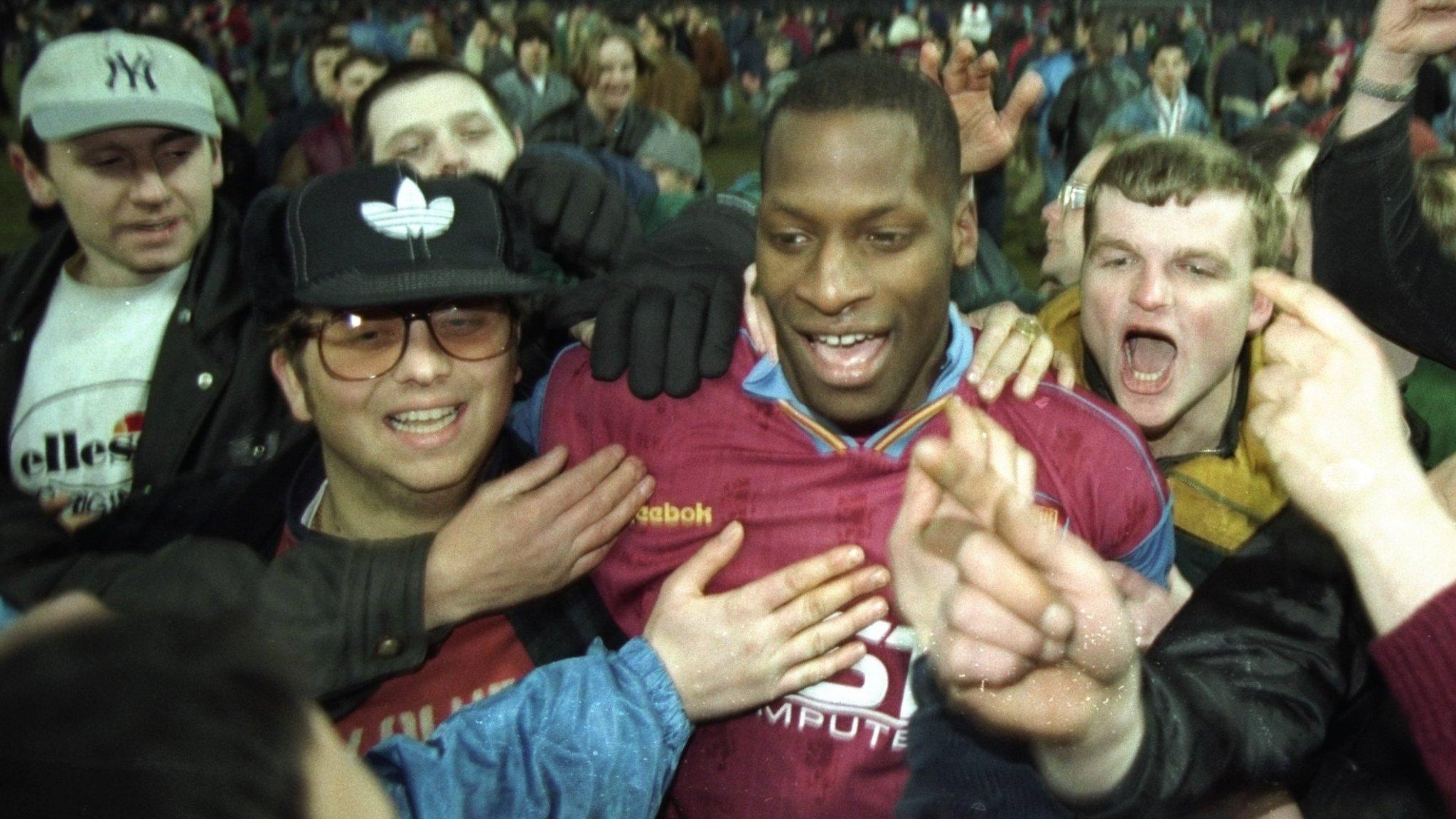Ugo Ehiogu dies: Former England defender 'a hugely popular football figure'
- Published
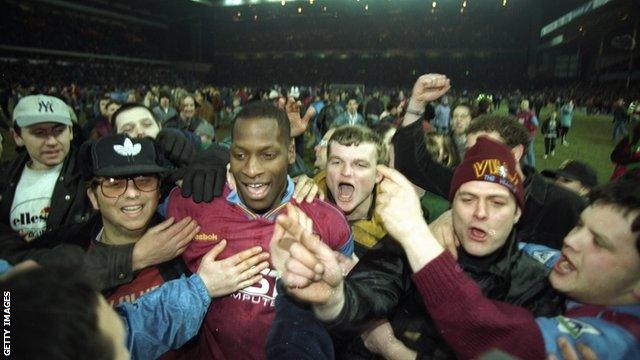
Ehiogu celebrates with Aston Villa fans after reaching the final of the 1996 League Cup at the expense of Arsenal. Ehiogu won the trophy three times in his career - 1994, 1996 and 2004
Ugo Ehiogu, who has died at the age of 44 after suffering a cardiac arrest, was not just a highly accomplished and successful defender who was forging a growing reputation as a coach - he was a hugely popular figure within the game.
The reaction to his death after collapsing at Tottenham's training centre, the club where he was an under-23s coach, is a reflection of the esteem in which Ehiogu was held.
Ehiogu was a powerful, imposing figure as a player and a well-rounded character away from the game, making a career in the music business while also shaping the future of the next generation at Spurs.
He was a player who should have won many more than his four England caps - but still enjoyed a fine career and seemed destined for more success in the next stage of his development as an important member of the Spurs backroom team before his death.
Development and success at Villa
Ron Atkinson was one of Ehiogu's biggest champions and can regard the £40,000 it took to take the teenager from West Bromwich Albion to Aston Villa in August 1991 as one of his most astute moves in the market.
Ehiogu was raw but the potential was there and even through some uneasy early moments in his career, Atkinson dismissed the doubters and never wavered in his belief that the Homerton-born powerhouse - a product of the Senrab Football Club that could count the likes of John Terry, Sol Campbell and Jermain Defoe among its former players - would be a success.
And his judgement, both in making the bargain deal and mapping out Ehiogu's future, was accurate.
Current Villa manager Steve Bruce, who played against Ehiogu for Manchester United, said: "Big Ron bought him and what a bargain. He was a great player."
Football world remembers 'inspirational' Ehiogu
Atkinson recalled "the nervous 18-year-old" who arrived but who then became an integral component of a fine era at Villa Park.
He formed one half of a formidable central defensive partnership with Paul McGrath, whose brilliance and experience aided his development, and also played in the Villa rearguard alongside England manager Gareth Southgate.
The trio were part of the Villa team that won the League Cup at Wembley in March 1996 with a 3-0 victory over Leeds United, cementing his status with the Holte End, who regarded him as a reassuring and inspirational presence in the side throughout more than 200 appearances.
Andy Townsend, who played in that League Cup-winning side, says: "Like all younger players it wasn't easy for him at the start of his Villa career - but in the end you saw that nobody was going to get the better of him.
"He was a commanding and formidable in the air, a player that every team would like to have at the back."
Ehiogu was alongside Southgate when Villa lost the 2000 FA Cup final - the last played under Wembley's Twin Towers - 1-0 to Chelsea and the pair were to link up once again at Middlesbrough.
That showpiece was Ehiogu's last fling with Villa as he soon moved on to fresh pastures and a glorious, unexpected new chapter in his career.
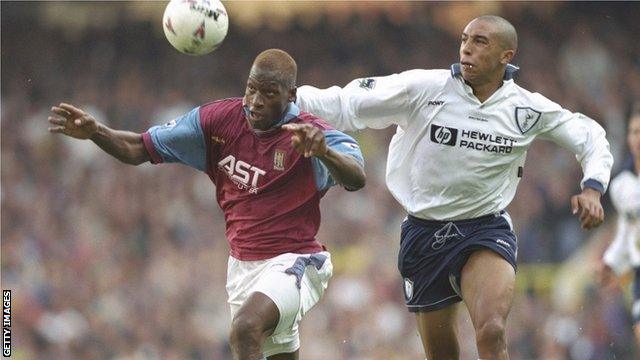
Ehiogu spent nearly a decade at Aston Villa after joining them for £40,000 from West Brom in 1991. When he left in 2000 he had played 237 league games for the club.
Ehiogu shapes golden era at Boro
Middlesbrough signed many outstanding players during Bryan Robson's reign as manager - and Ehiogu can take his place near the top of the list following his move from Villa to Teesside for a then club record fee of £8m in October 2000.
Boro chairman Steve Gibson was prepared to bankroll the acquisition of high-profile, high-quality signings and Ehiogu fell perfectly into that category as the expenditure was rewarded with performances that ensured he will always be fondly remembered at the Riverside.
He did start to suffer with the knee problems that would undermine the latter days of his career but it was at Boro where his friendship with Southgate continued to blossom, first as team-mates when the latter made the same journey from Villa as Steve McClaren's first signing as manager in July 2001, and then when Southgate took over as manager.
The old defensive firm was soon back in action and providing the platform of solidity, experience and ability that culminated in both playing key roles as Boro won their first major trophy in 128 years with a 2-1 in over Bolton Wanderers at Cardiff's Millennium Stadium in the 2004 Carling Cup final.
It was a Boro side laced with quality players, such as Gaizka Mendieta and Juninho. Mark Schwarzer was their outstanding keeper and he remembers the cool colleague who exuded authority, saying: "He was always calm and reassuring. He was not too vocal but spoke when he needed to speak. He was a completely dedicated footballer."
Boro entered the uncharted waters of European glory to reach the 2006 Uefa Cup final, but it was to provide a signal that Ehiogu's time at his peak was drawing to a close. They were thrashed 4-0 by Sevilla in Eindhoven and he was only an unused substitute.
As at Villa, Ehiogu will be associated with success at Boro and chairman Gibson delivered a warm tribute when he said: "Ugo was one of the heroes at Cardiff when the club won its only ever major trophy, Ugo and Gareth Southgate were the rock on which Steve McClaren brought the club the best period in its history.
"He wasn't just a good footballer. He was a great man."
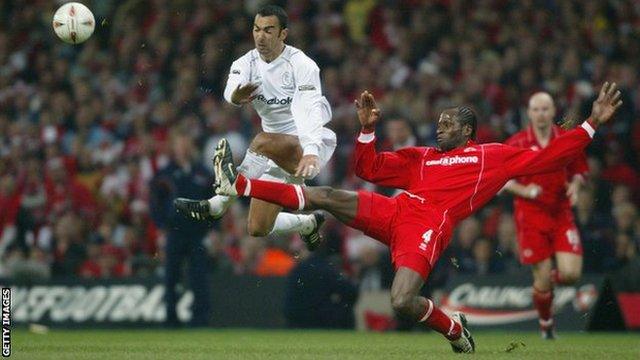
Ehiogu left Villa for Middlesbrough for a then club-record fee of £8 million in 2000
Unfulfilled with England
Ehiogu won only four England caps, a victim of injuries and the sheer quality of competition from the likes of John Terry, Rio Ferdinand and Sol Campbell - but he still played his part in a piece of history.
He was named as a substitute by Sven-Goran Eriksson - the side's first foreign manager - for his first game in charge against Spain at Villa Park on 28 February 2001, scoring after coming on.
Ehiogu also gave away a penalty but keeper Nigel Martyn saved Javi Moreno's spot-kick.
Archive: Ehiogu scores for England in Spain friendly
Injuries strike as career winds down
Ehiogu's struggle with knee problems meant his career came to a low-key close with loan spells at Leeds United, Rangers and Sheffield United, retiring in August 2009 after a trial with MK Dons.
He was still not prepared to go quietly, however, and revived memories of his glory days with a goal that ensured he will be remembered forever at Ibrox, a spectacular overhead kick that gave Rangers a 1-0 derby win against Celtic in March 2007.
It was voted 'goal of the season' by Rangers fans and the surprised goalscorer smiled as he said: "I couldn't have written a better script. It was probably my best goal ever. A surreal moment."
Once again, the towering defender had made his presence and personality felt when it mattered.
Archive: Ugo Ehiogu's winning goal for Rangers against Celtic in 2007
Ehiogu the music mogul
As he moved into coaching at Spurs, initially working at the Premier League club's academy under Chris Ramsey and Tim Sherwood, Ehiogu's love of music started to play a greater role in his life.
The man who admitted he "used to get psyched up to a bit of Bon Jovi before games" helped set up Dirty Hit, a record label with the likes of The 1975, Ben Khan, Superfood and Fossil Collective on its books.
It was the mark of a personality who enjoyed life and pursued wider interests outside football. He said: "My love of football is massive but my love of music is amazing. You have people eating out of your hands when you're singing."
Ehiogu was a musical mentor as well as a wise counsel and guide to the young players at Spurs.
He was a distinguished man as a player and coach in a career carried out with professionalism, dignity, respect and success.
- Published21 April 2017
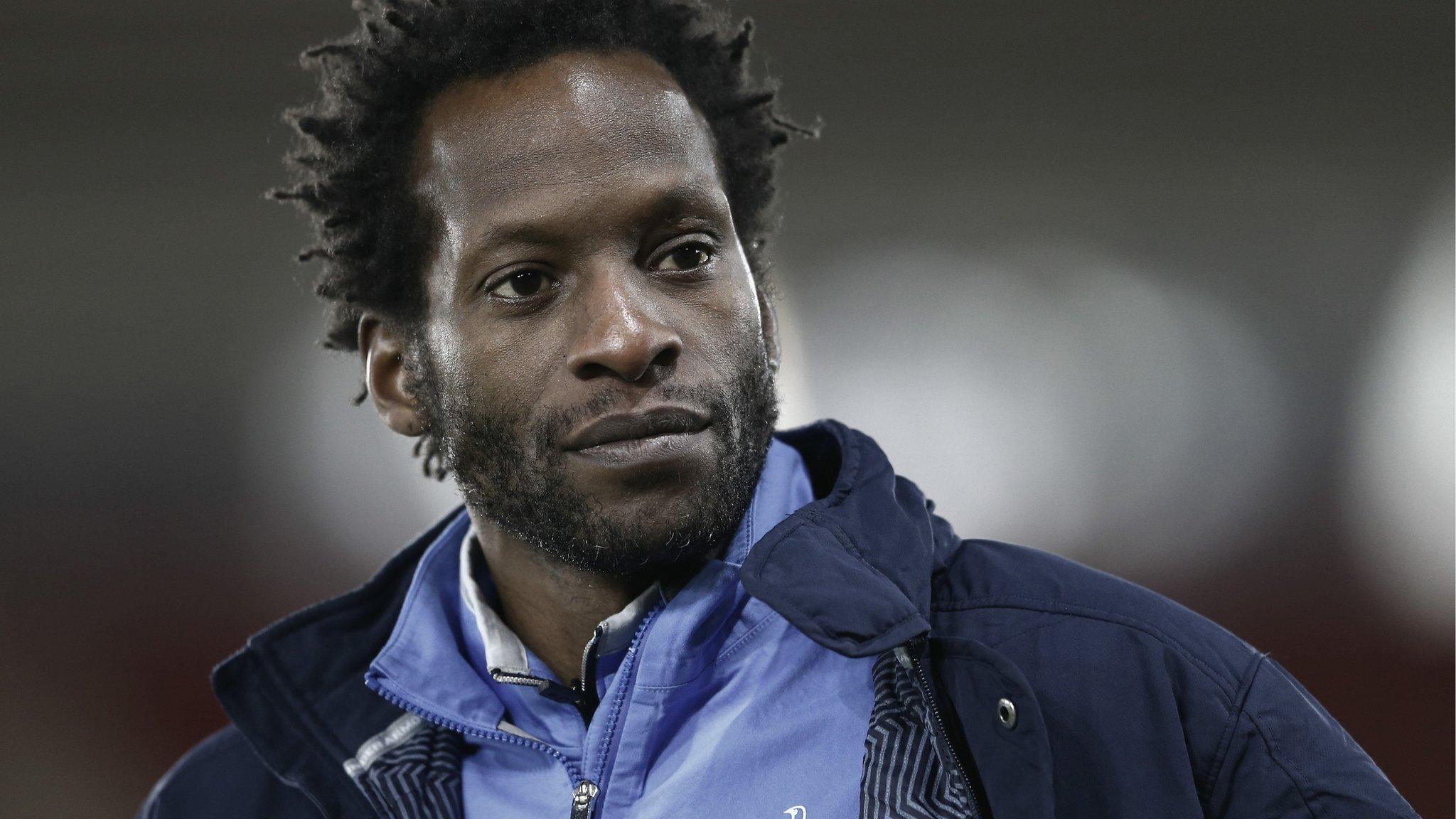
- Published22 April 2017
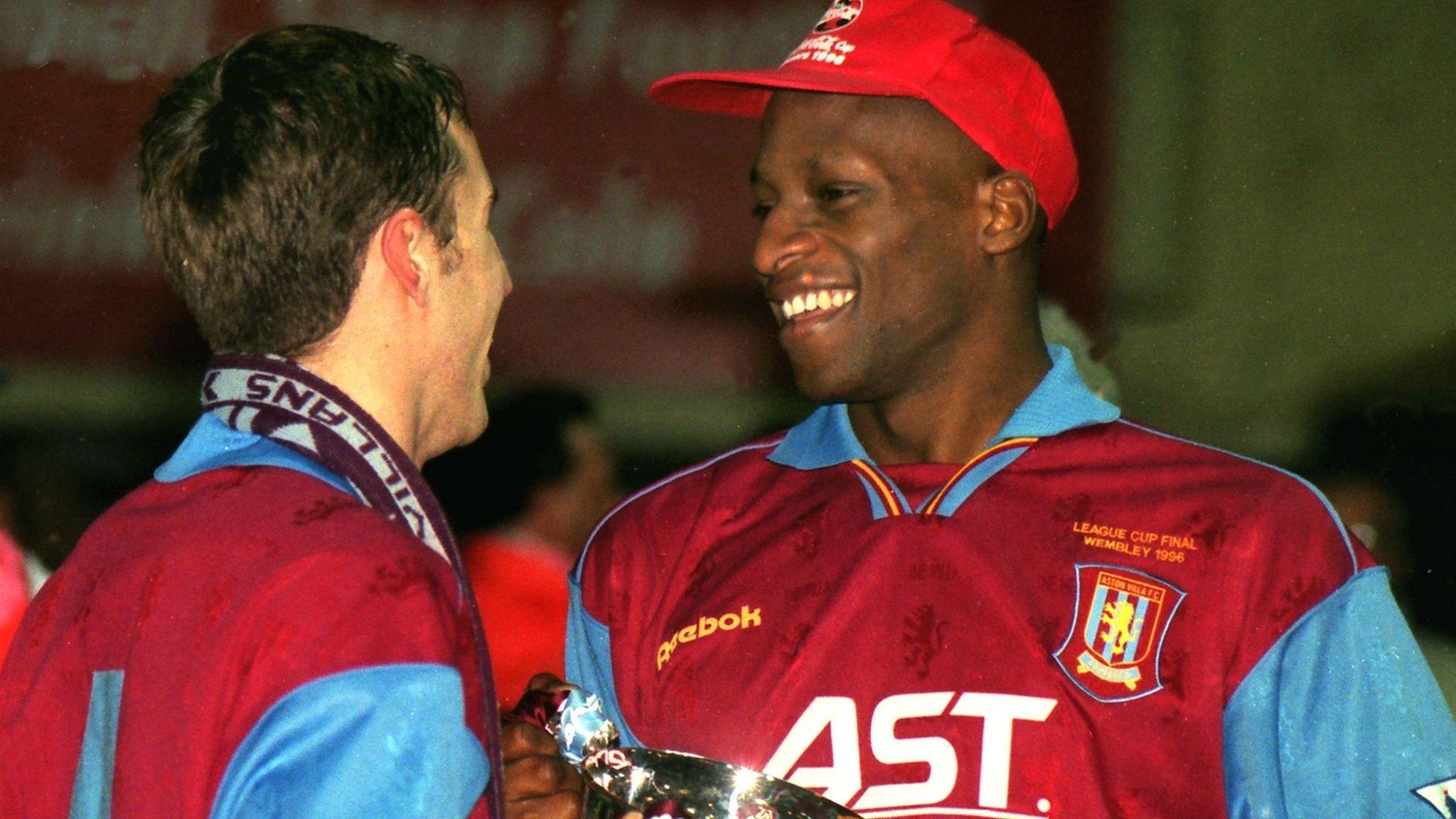
- Published12 April 2017
